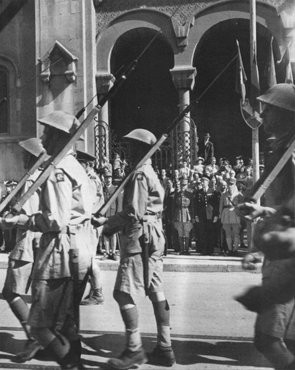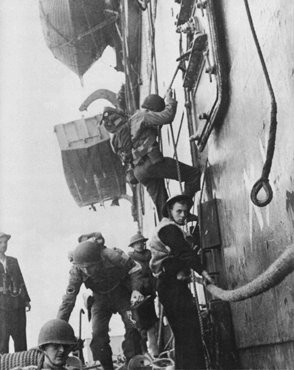
Allied Military Operations in North Africa
The North African military campaigns of World War II were waged between September 13, 1940, and May 13, 1943. They were strategically important for both the Western Allies and the Axis powers. The Axis powers aimed to deprive the Allies of access to Middle Eastern oil supplies, to secure and increase Axis access to the oil, and to cut off Britain from the material and human resources of its empire in Asia and Africa.
In addition, after the disastrous defeat in western Europe in spring 1940, the North African campaign offered the Allies the opportunity to open up a new front against the Axis, and, after Germany invaded the Soviet Union in June 1941, to ease German pressure on the eastern front.

The North African campaign had three phases:
- the Western Desert campaign (western Egypt and eastern Libya)
- Operation Torch (Algeria and Morocco)
- the Tunisia campaign
During the entire North African campaign, the Germans and Italians suffered 620,000 casualties, while the British Commonwealth lost 220,000 men. American casualties in Tunisia alone totaled more than 18,500. The Allied victory in North Africa destroyed or neutralized nearly 900,000 German and Italian troops, opened a second front against the Axis, permitted the invasion of Sicily and the Italian mainland in the summer of 1943, and removed the Axis threat to the oilfields of the Middle East and to British supply lines to Asia and Africa. It was critically important to the course of World War II.
Egypt, Libya, Tunisia, Algeria, and Morocco
In 1940 each of the five territories along the North African coast—Egypt, Libya, Tunisia, Algeria, and Morocco—had a colonial or semi-colonial status under a European power. Britain formally established a protectorate over Egypt in 1914. Despite granting Egypt nominal independence under Sultan Fuad I in 1922, Britain retained control of Egyptian foreign policy and military defense. Britain also occupied the shores of the Suez Canal. British control of Egypt was reconfirmed under the 1936 Anglo-Egyptian Treaty. Italy conquered the provinces of Cyrenaica, Tripolitania, and Fezzan from the Turks in 1911 and renamed the unified colony Libya in 1934.
France established a formal protectorate over Tunisia in 1881; the Tunisian ruler was supervised by a French Resident-General. Morocco, ruled by a Sultan, had become a French protectorate under the Treaty of Fez in 1912; as in Tunisia, a French Resident-General supervised the Sultan and his bureaucracy. France began its conquest of Algeria in 1830. By 1940, Algeria had been made a formal part of France ruled directly by a Governor-General. With the collapse of France and the establishment of the Vichy regime in 1940, the French North African colonies came under Vichy control.
Critical Thinking Questions
- What was the relationship between German expansion and the fate of Jews in North Africa?
- Research the concentration camps set up in North Africa. What was their purpose? Who was imprisoned? Who administered the camps?
- Learn about Arab rescuers of Jews.
- Learn about the diverse Jewish communities of North Africa before World War II.

